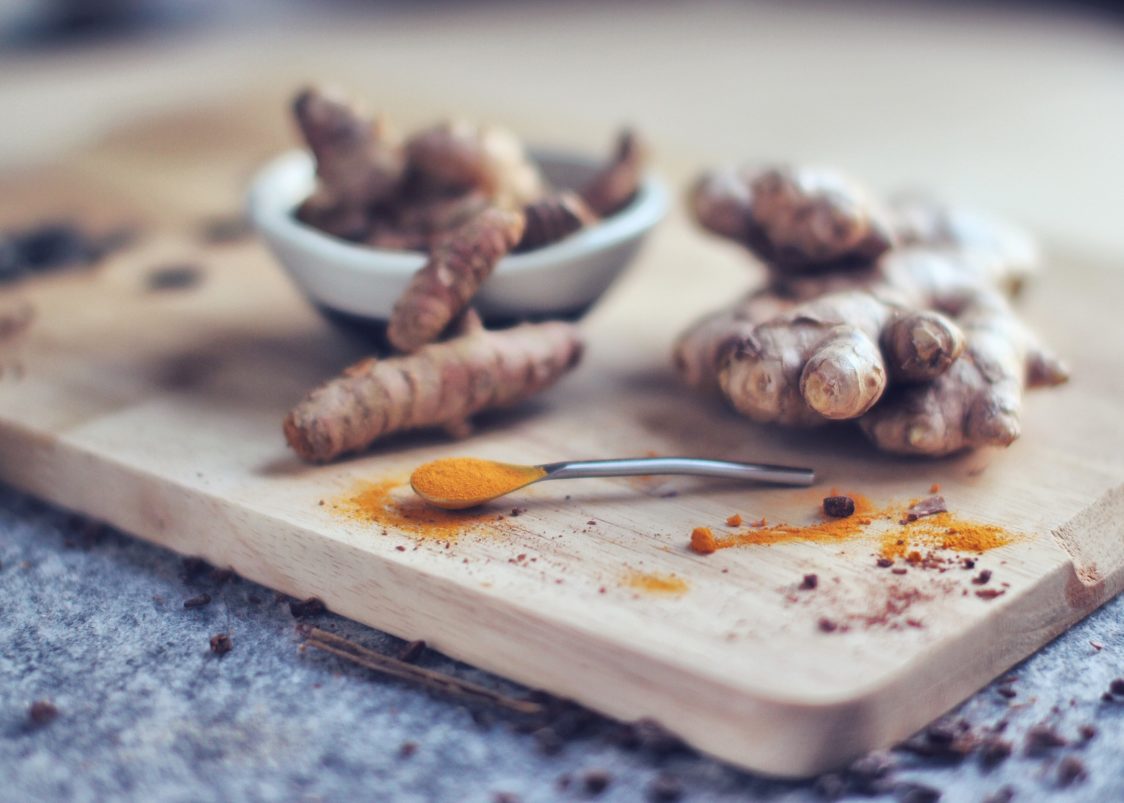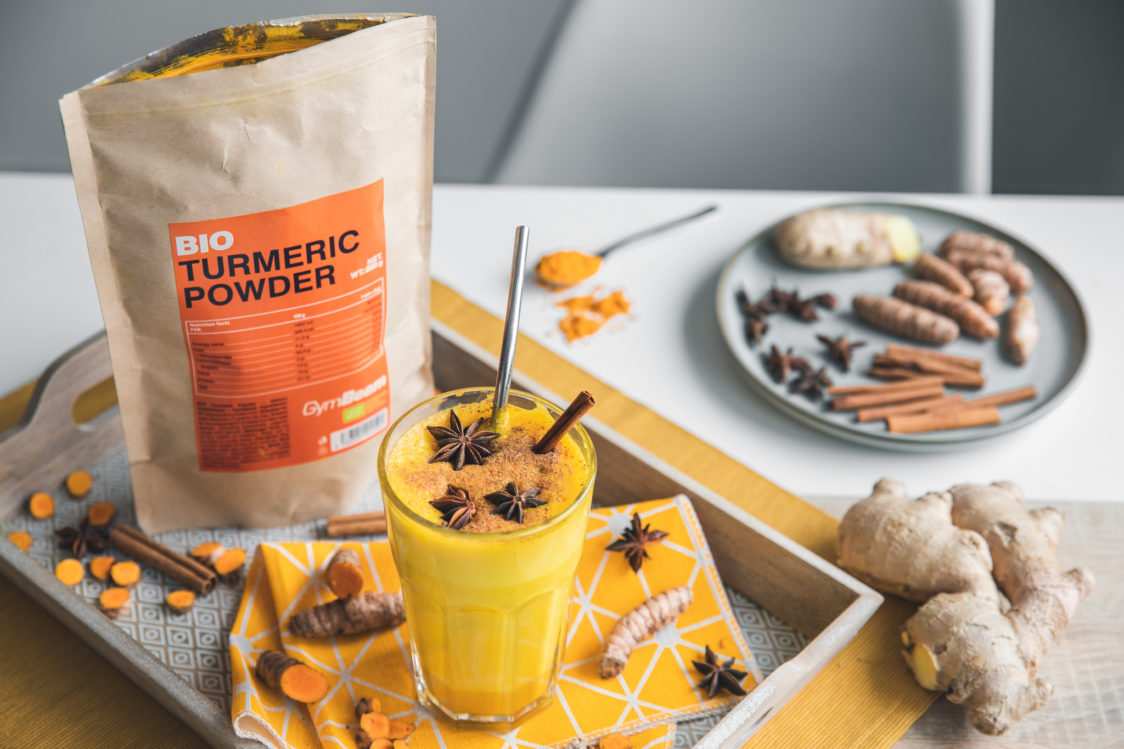Table of Contents
Until recently, turmeric was a quite unknown exotic spice in European countries. Its popularity continues to grow as turmeric not only gives food colour and taste, but also antioxidants to the human body. Turmeric affects the body in several areas, so it is useful to know its benefits not only in the kitchen, but also for health.
What is turmeric?
If you have ever seen the root of turmeric, not just its powdered form, you will certainly have a similar shape to the ginger root. It is no coincidence at all, since turmeric (Curcuma longa) belongs to the same family of Zingiberaceae. It has been grown in tropical regions of Asia for its root, or rhizome, which has been known as a dye or spice since ancient times. Humanity has been using it for about 4,000 years and has its place in Chinese and Ayurvedic traditional medicine. [1] [2] [3]
Turmeric is best known for its use in Asian cuisine, where it forms part of a curry mix. However, it is also a component of butter, cheese or mustard. It is characterized by a bitter flavour, spicy aroma and a distinctive yellow colour, due to its component – curcumin. [2] [4]
Curcumin is a polyphenol, chemically designated as diferuloylmethane, and is the major bioactive component of turmeric. It has been shown to act at the cellular level in the human body and to affect several signalling molecules. Curcumin has anti-inflammatory properties and can increase the content of antioxidants that are needed to combat oxidative stress. It is an important constituent of turmeric, but its content in the plant is only about 3%. Many studies that investigated the effect of turmeric have used an extract mainly containing curcumin. The full effect of curcumin can not be achieved by using it in the diet, but by supplementing supplements with a significant content of curcumin. Another important fact is the poor absorption of curcumin. You can promote the absorption of curcumin by eating black pepper with turmeric. Black pepper contains piperine, which improves the absorption of curcumin by up to 2000%. [5] [6] [7]

Nutrient content of turmeric
Turmeric is most available in the form of ground powder extract. On the market, the raw root is also on sale, but also extract in the form of a concentrated drink or shot. For better orientation in the composition of turmeric, here is a table with an overview of its important components [8]:
| Energy value | 354 kcal |
| Protein | 7,8 g |
| Cabrohydrates | 64,9 g |
| of which dietary fibre | 21,1 g |
| of which sugars | 3,2 g |
| Fats | 9,9 g |
| of which saturated fats | 3,1 g |
| of which monounsaturated fats | 1,7 g |
| of which polyunsaturated fats | 2,2 g |
| of which omega-3 fatty acids | 482 mg |
| of which omega-6 fatty acids | 1 694 mg |
| Calcium | 183 mg |
| Magnesium | 193 mg |
| Potassium | 2 525 mg |
| Iron | 41,4 mg |
| Zinc | 4,3 mg |
| Sodium | 38 mg |
| Vitamin B3 | 5,1 mg |
| Vitamin B6 | 1,8 mg |
| Folic acid | 39 μg |
| Vitamin C | 25,9 mg |
| Vitamin E | 3,1 mg |
You might be interested in these products:
5 benefits of turmeric for the human body
1. Anti-inflammatory effects
Inflammation is a reaction of the immune system to the presence of harmful substances in the human body. Inflammation is generally considered an undesirable phenomenon, yes, that is true, but without inflammation, the body would not be able to fight pathogens. Short term inflammations that help to overcome difficulties are not a problem. Chronic inflammation associated with attacking the body by its own cells is a source of difficulties.

Chronic inflammation may also be due to the so-called “western way of dieting”, which includes increased doses of sugar, alcohol or processed foods. Turmeric and other unprocessed food sources, including vegetables or fruit, are helpful in reducing inflammation in the body.
An important component of curcuma with anti-inflammatory effects is the already mentioned curcumin. A 2004 study looked at the effectiveness of NSAIDs and their anti-inflammatory and anti-proliferative effects. According to the results, the right amount of curcumin is a useful fighter against inflammation, even better than conventional anti-inflammatory agents such as aspirin or ibuprofen.
Research has even found that aspirin and ibuprofen had the lowest anti-inflammatory effect of the test substances. Among the substances with the best anti-inflammatory properties were curcumin or resveratrol (a component of red grapes). [11] [12] [13]
Chronic inflammations weaken the immune system and contribute to chronic diseases, but curcumin may be useful in the treatment of, for example, arthritis or pancreatitis.
The Arthritis Foundation reports that turmeric can reduce joint problems in people suffering from arthritis. The company recommends taking capsules containing 400-600 mg of turmeric 3 times a day to relieve inflammation. The Arthritis Foundation makes recommendations with regard to citing several scientific studies that in the results point to the positive effect of turmeric.
2. Antioxidant effects
Food and overall substances that are effective against free radicals have antioxidant effects. These unstable atoms damage human cells and cause disease or aging. Free radicals arise naturally in the human body and the body’s ability to fight them is lost along with increasing age, leading to degenerative processes and body aging. In addition to naturally occurring radicals, we increase their occurrence in the body by improper diet, such as alcohol, smoking or fried food. [15]
Curcumin is an effective ingredient with antioxidant effects in turmeric, which also has the ability to start antioxidant enzymes in the body. A 2017 study examined the antioxidant properties of turmeric water and ethanol extracts. The results show that turmeric is a natural antioxidant due to its activity in the fight against free radicals and high content of flavonoids, polyphenols, tannins or ascorbic acid. Natural sources of antioxidants are a great alternative to antioxidants in the form of commercial food additives. Indeed, commercial antioxidants are artificially manufactured and may contain a considerable amount of preservatives. [10] [16]

3. Support for brain activity
There has been a general belief in the past that brain cells only reproduce in early childhood. Neurons, however, are able to form new connections and also increase their numbers thanks to the brain-derived neurotrophic factor (BDNF) protein. It is found in the brain and spinal cord, and its function is not only to maintain healthy neurons but also to regulate communication between nerve cells. The ability to keep brain cells healthy and even to create new connections is particularly important in terms of aging and the natural loss of brain cells. It is supported by scientific studies that curcumin can increase BDNF levels in the brain, thereby slowing or reversing brain diseases. [7] [10] [11]

4. Promoting optimal blood sugar levels
The key benefit of turmeric on the body is in its anti-inflammatory properties, but may also be useful for people with pre-diabetes.
According to a 2012 survey, consumption of curcumin for 9 months had a positive effect on study participants.
After a period of time, the outcome was compared based on the development of the disease into type 2 diabetes.
- 16.4% of participants in the placebo group were diagnosed with diabetes.
- No participants were found in the curcumin group.
In addition, the results indicate that in the curcumin group, the function of the β cells responsible for insulin production has improved.
There was no adverse effect on the participants compared to the placebo group.
According to the results, curcumin extract is safe and brings advantages for its use in interventional pre-diabetes treatment. [9] [17]
5. Reduction of heart disease
Chronic inflammation of the body is associated with the occurrence of heart disease, and they are the number one cause in mortality in the world. One advantage of curcumin is the effect on the endothelium, which is the inner layer of blood vessels. Heart problems may arise due to endothelial malfunction and lack of pressure regulation. [10]
Curcumin is a bioactive component of curcuma and its effect on cardiovascular disease is reported in a 2009 scientific survey. The antioxidant effects of curcumin reduce the cardiotoxicity caused by adriamycin, thus preventing cardiovascular complications in patients suffering from diabetes. The anti-inflammatory effect of curcumin may also prevent atrial arrhythmias and may contribute to the prevention of ventricular arrhythmias by modifying Ca homeostasis (2). [18]

Risks of consuming turmeric
Consumption of turmeric is generally considered safe, but its high doses may present some health risks. Some dietary supplements with 500 mg turmeric extract recommend 4 capsules a day. Increased doses of turmeric may reduce blood pressure and blood sugar levels, people taking diabetes medicines and blood pressure should therefore be cautious about taking dietary supplements containing it. Consultation with a doctor before taking higher doses of turmeric is also appropriate because turmeric affects the processing of medicines in the liver. [1] [19]

Turmeric is not just an exceptional spice and dye. Its presence in food and the supplementation of curcumin has many advantages for the human body. There are not many researches that accurately describe the benefits of turmeric, but we believe that their numbers will increase as well as the popularity of turmeric. Turmeric gives the food colour and taste, but also antioxidants for better resistance to oxidative stress. We believe that turmeric information has captivated and inspired you. Do you want your friends to know about turmeric and its health? Then don’t hesitate and support the article by sharing.
[1] Lauren Cox – What Is Turmeric? – https://www.livescience.com/41760-turmeric-supplement-facts.html
[2] Turmeric – https://www.britannica.com/plant/turmeric
[3] Jednoklíčnolistové rastliny – ľaliotvaré, asparágotvaré, arekotvaré a ďumbierotvaré – https://biopedia.sk/rastliny/jednoklicnolistove-rastliny-laliotvare-asparagotvare-arekotvare-dumbierotvare
[4] TURMERIC – https://www.webmd.com/vitamins/ai/ingredientmono-662/turmeric
[5] Susan J. Hewlings, Douglas S. Kalman – Curcumin: A Review of Its’ Effects on Human Health – https://www.ncbi.nlm.nih.gov/pmc/articles/PMC5664031/
[6] Kamal Patel – Curcumin – https://examine.com/supplements/curcumin/
[7] Kris Gunnars – 10 Proven Health Benefits of Turmeric and Curcumin – https://www.healthline.com/nutrition/top-10-evidence-based-health-benefits-of-turmeric
[8] Spices, turmeric, ground – https://nutritiondata.self.com/facts/spices-and-herbs/212/2
[9] Jon Johnson – How can turmeric help treat diabetes? – https://www.medicalnewstoday.com/articles/317721
[10] 13 Proven Health Benefits of Turmeric – https://foodbabe.com/13-proven-health-benefits-of-turmeric/
[11] Lauren Bedosky – 12 Scientific Health Benefits of Turmeric and Curcumin – https://www.everydayhealth.com/diet-nutrition/diet/scientific-health-benefits-turmeric-curcumin/
[12] Takada Y, Bhardwaj A, Potdar P, Aggarwal BB – Nonsteroidal anti-inflammatory agents differ in their ability to suppress NF-kappaB activation, inhibition of expression of cyclooxygenase-2 and cyclin D1, and abrogation of tumor cell proliferation. – https://www.ncbi.nlm.nih.gov/pubmed/15489888
[13] Kamal Patel – Resveratrol – https://examine.com/supplements/resveratrol/
[14] Kathryn Watson – The positive and negative health effects of turmeric – https://www.medicalnewstoday.com/articles/318405
[15] Zawn Villines – How do free radicals affect the body? – https://www.medicalnewstoday.com/articles/318652
[16] E. M. Tanvir, Sakib Hossen, Fuad Hossain, Rizwana Afroz, Siew Hua Gan, Ibrahim Khalil, and Nurul Karim – Antioxidant Properties of Popular Turmeric (Curcuma longa) Varieties from Bangladesh – https://www.hindawi.com/journals/jfq/2017/8471785/
[17] Somlak Chuengsamarn, Suthee Rattanamongkolgul, Rataya Luechapudiporn, Chada Phisalaphong, Siwanon Jirawatnotai – Curcumin Extract for Prevention of Type 2 Diabetes – https://www.ncbi.nlm.nih.gov/pmc/articles/PMC3476912/
[18] Wongcharoen W, Phrommintikul A. - The protective role of curcumin in cardiovascular diseases. – https://www.ncbi.nlm.nih.gov/pubmed/19233493
[19] Steven Foster – Turmeric – https://www.nccih.nih.gov/health/turmeric


Add a comment